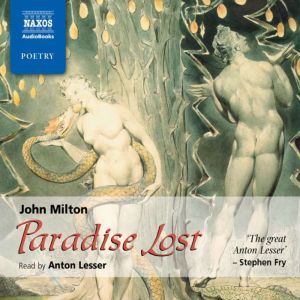

Paradise Lost
Author: John Milton
Narrator: Anton Lesser, Laura Paton, and Chris Larkin
Abridged: 3 hr 56 min
Format: Digital Audiobook Download
Publisher: Naxos
Published: 05/01/2005
Categories: Fiction, Poetry, European Poetry


Author: John Milton
Narrator: Anton Lesser, Laura Paton, and Chris Larkin
Abridged: 3 hr 56 min
Format: Digital Audiobook Download
Publisher: Naxos
Published: 05/01/2005
Categories: Fiction, Poetry, European Poetry
John Milton was born in London, England, on December 9, 1608, into a middle-class family. He was educated at St. Paul's School, then at Christ's College, Cambridge, where he began to write poetry in Latin, Italian, and English, while preparing to enter the clergy.
After university, however, he abandoned his plans to join the priesthood and spent the next six years in his father's country home in Buckinghamshire studying and preparing for a career as a poet. He gained proficiency in Latin, Greek, Hebrew, French, Spanish, and Italian, and obtained a familiarity with Old English and Dutch as well.
In 1642, Milton returned from a trip into the countryside with a sixteen-year-old bride, Mary Powell. Even though they were estranged for most of their marriage, she bore him three daughters and a son before her death in 1652. Milton later married twice more.
During the English Civil War, Milton championed the cause of the Puritans and Oliver Cromwell, and wrote a series of pamphlets advocating radical political topics, including the morality of divorce, the freedom of the press, populism, and sanctioned regicide. Milton served as secretary for foreign languages in Cromwell's government, composing official statements defending the Commonwealth. During this time, Milton steadily lost his eyesight and was completely blind by 1651. He continued his duties, however, with the aid of Andrew Marvell and other assistants.
After the Restoration of Charles II to the throne in 1660, Milton was arrested as a defender of the Commonwealth, fined, and soon released. He lived the rest of his life in seclusion in the country, completing the blank-verse epic poem Paradise Lost, which is widely regarded as his masterpiece and one of the greatest epic poems in world literature. Milton also produced a sequel, Paradise Regained, and the tragedy Samson Agonistes. Milton oversaw the printing of a second edition of Paradise Lost in 1674, which included an explanation of "why the poem rhymes not," clarifying his use of blank verse, along with introductory notes by Marvell. He died shortly afterwards, on November 8, 1674, in Buckinghamshire, England.
There's all this debate over why Satan is so appealing in Paradise Lost. Did Milton screw up? Is he being cynical, or a double-secret atheist? And why is God such a dick? But no one asks whether, say, Shakespeare screwed up in making Iago so much fun; they just give him credit for writing an awesome......more
in middle school i had seen this book lying around the house and for some reason it struck me as very impressive. i didn't ever want to read it but i wanted to give off the impression that i was the type of person who would read it. i did this with a few other books too (catcher in the rye, on the r......more
Paradise Lost is the quintessential epic poem and its protagonist, Satan, is the quintessential anti-hero. “Better to reign in Hell, than to serve in Heaven.” It’s almost impossible to read this without, in some way, sympathising with him. Although he is vain, full of pride and evil, he is still......more
Portions of this book were assigned for my Brit Lit class. I read about half of the assigned portions. I was distracted at the time by various events in life and wasn't yet a very good student. My professor had done his PhD work on Milton and taught with a contagious passion. So much passion that I......more
Milton wrote this while blind, and claimed it was the result of divine inspiration which visited him nightly. There are few texts that could reasonably be added into the Bible, and this is certainly one of them (the Divine Comedy is another). Paradise Lost outlines portions of the Bible which, thank......more